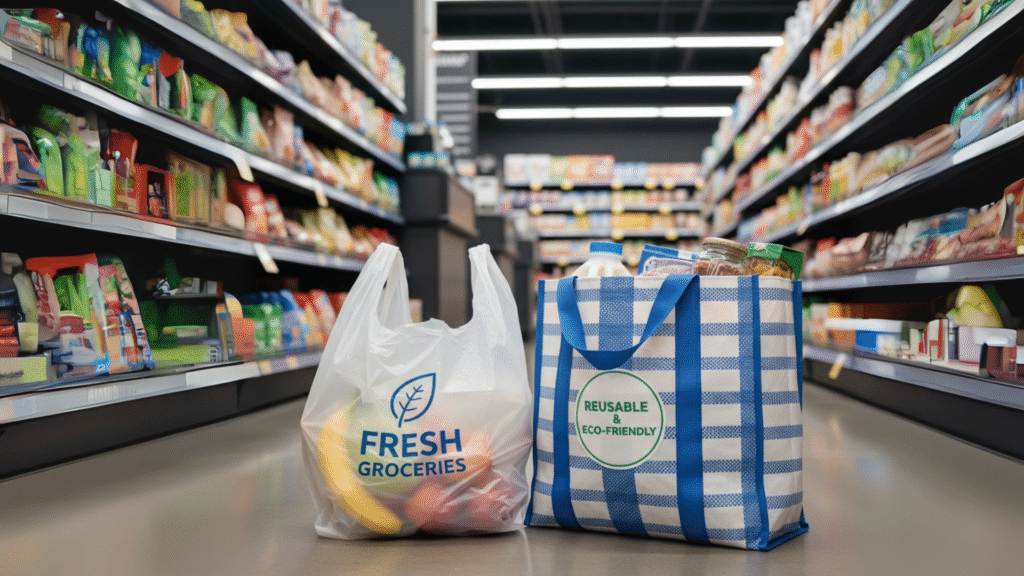Do you find yourself in a dilemma when choosing between single-use and reusable bags? This is obvious as you need to address two important factors—ensuring convenience to your customers as well as sustainability.
That’s why you may find it a bit tricky to make a choice.
Let us help you with this guide covering the comparison between single-use and reusable bags, so that you can know the benefits and drawbacks of each. We hope that you will be able to make an informed decision by the end of the blog. Let’s get started.
Single-Use vs Reusable Bags: What You Need to Know
Single-use bags are likely to be the easy choice. They are cheap, store easily, and customers are familiar with them. Reusable bags, however, mean more upfront costs, but they offer long-term benefits for both businesses and the planet.
If we examine more closely a comparison of a plastic bag, these two choices have vastly different implications. The concern now isn’t just about saving money — it’s about the environmental impact that bags can have and how your brand wants to show itself to today’s eco-conscious customers.
The Case for Single-Use Bags
When you hear “single-use bag,” it’s likely that you think of a flimsy plastic grocery bag. But that category is far wider, and includes paper bags themselves – a single-use item which can often be more environmentally friendly than plastic.
Pros of Single-Use Bags:
Low Initial Cost:
This is the most important benefit for most companies. Single-use bags, particularly plastic ones, are dirt cheap to buy in bulk.
Convenience and Hygiene:
There are some industries for which single-use bags are essential. Consider food and pharmaceuticals, where hygienic conditions and avoiding contamination are of utmost concern. Safety is ensured with a new, clean bag for every customer.
No Return Logistics:
Unlike reusable bag programs, where you might need to manage returns or refills, single-use bags are a “one-and-done” solution. This simplifies your operations and is especially useful for businesses that ship products internationally, as it avoids the cost and effort of getting bags back.
Variety and Customisation:
Especially in the case of paper bags, several sizes/folds and colors together with printing options are available. You can easily add your logo as well as other design elements.
Single-Use Bag Disadvantages
Single-use plastic bags have been the go-to bag for generations, but they also come with their downsides, listed below:
Environmental Pollution
Plastic bags are among the biggest creators of pollution. They frequently end up in landfills, oceans, and streets, where they can remain for hundreds of years. This continuous buildup of waste can impact wildlife and ecosystems.
Limited Usefulness
Single-use bags are very thin, so they tear easily. Customers frequently toss them out after each use.
Negative Public Perception
As awareness of plastic pollution has grown, more customers are criticizing businesses that give away disposable bags.
Regulatory Pressure
Many localities have prohibited single-use plastics. You may end up with additional costs and even land legal troubles as a result of using them.
WHAT ARE THE BENEFITS OF REUSABLE SHOPPING BAGS?
Durability and Convenience
By contrast, many reusable shopping totes are built from more substantial materials — cloth, jute, or plastic that’s significantly thicker than film. They can carry a lot more items, and they last longer, so for the person who’s buying them, they are much more practical.
Eco-Friendly Bags Build Goodwill
In other words, when you offer bags made of recycled materials to your customers, it is a subtle reminder that your company is an environmentally-conscious one. This can increase brand loyalty and attract eco-minded shoppers to your store.
Cost Savings over Time
Reusable bags may be more expensive up front, but they don’t need to be replaced as frequently. You can even earn some additional income if you sell them for profit.
Positive Marketing Opportunity
Many businesses put their logo on reusable shopping bags. Every time a customer reuses your bag, you get an impression.
These reusable bag advantages make them a wise purchase for businesses with an eye on the future.
Cons of Reusable Bags:
Upfront Costs:
The upfront cost of reusable bags is significantly more than that of single-use bags. You will not get a good price unless you buy in bulk, and that can be a big hurdle for new businesses.
Production and “Breakeven” Point:
It’s worth noting that reusable bags, especially cotton ones, require a lot of resources to produce. So, for a reusable bag to be better for the environment than a single-use plastic bag, it has to be used many times. For instance, you’d have to use a cotton bag more than 100 times before it had the same environmental impact as a light plastic bag.
Environmental Impact of Bags
We all know that when it comes to the environment, the difference between single-use and reusable bags is clear.
Disposable Bags:
They are a significant contributors to plastic pollution. They often find their way to be ended up in landfills or the ocean and release toxic chemicals as they break down.
Reusable Bags:
They are a safer option from a sustainability viewpoint.
A cotton or jute bag, for instance, must be carried dozens of times before its production impact breaks even with that of a single-use plastic bag — but after it hits that point, a reusable option is much more sustainable than plastic.
This explains why the government, as well as various environmental groups, promotes sustainable shopping bags as a more permanent solution. By using one bag many times, shoppers cut the demand for countless single-use bags.
Plastic Bag Compare: Cost vs Accountability
Single-Use Bags
- Low cost per unit
- Convenient to supply
- Harmful to the environment
- Short lifespan
- Increasingly restricted by laws
Reusable Bags
- Higher cost per unit
- Long-lasting and durable
- Reduced waste and pollution
- Can be branded and resold
- Aligns with eco-friendly values
Economically, there’s a case for industry to cling to single-use bags. But from a long-term sustainability standpoint, reusable is clearly the better option over short-term savings.
How to Determine What’s Best for Your Business
So, how do you decide? Which is best for your business will depend on a few important factors:
Your Industry and Product:
Food & Medical:
If your business demands the highest levels of hygiene (for example, if it is a bakery, deli, or pharmacy), single-use bags are likely your safest choice.
Retail & Fashion:
Branded reusable bags would be great for clothing shops, boutiques, or even gift stores. It enhances the luxury or high-end experience of the customer and offers long-term advertising.
Groceries & Convenience:
This is the old battleground. The solution of providing both single-use and reusable bags, maybe even rewarding those customers who bring their own, is a thoughtful one.
Your Brand Identity:
Would you like to be the brand that everyone knows is a forward-thinking, sustainable company? If yes, then it’s time to invest in some reusable bags. Does your brand value speed and affordability more? Then disposable bags, such as strong paper bags, might suit your identity better.
Your Budget:
Do you have the upfront dollars to invest in a set of reusable bags? Just remember, you can more than make up this expense if you sell any of the bags or integrate them into some sort of customer loyalty program.
Will your customers pay for a reusable bag? If not, you may be forced to take a hit (and lose some profit).
Final Thoughts
The single-use vs reusable bags debate is more than just about cost — it’s also about how a business wants to project itself in today’s market.
Though single-use bags could still be cheaper upfront, their environmental impact, regulatory uncertainty, and negative consumer perception mean they are less dependable.
Reusable shopping bags and green bags not only help to eliminate waste, but they also create goodwill, foster loyalty to your brand, and position your business as responding to a growing need for environmentally friendly alternatives.
Customers are becoming increasingly aware of the impact bags have on our environment, and that businesses adopting sustainable shopping bags will be noticed. Opting for reusable isn’t just an environmentally smart decision; it’s a future-proof one.





